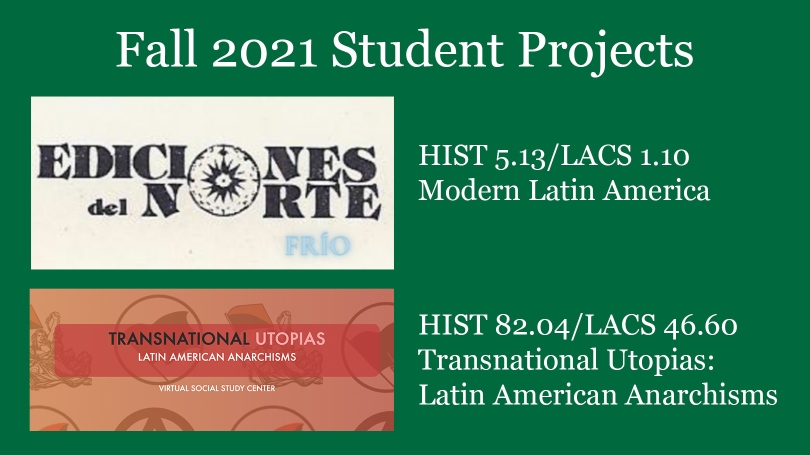
- Undergraduate
- Research
- Foreign Study
- Inclusivity
- News & Events
- People
Back to Top Nav
Back to Top Nav
Explore digital humanities class projects from students in HIST 5.13/LACS 1.10, Modern Latin America, and HIST 82.04/LACS 46.60, Transnational Utopias: Latin American Anarchisms, both taught by Professor Meléndez-Badillo in Fall 2021.
Explore the digital humanities class projects from students in Professor Meléndez-Badillo's courses in Fall 2021. Students in Modern Latin America produced a podcast, Ediciones del Norte Frío, and students in Transnational Utopias: Latin American Anarchisms created a virtual social study center.
Read Professor Meléndez-Badillo's description of the class projects below:
The Covid-19 pandemic has impacted our lives in multiple ways. Teaching online during the lockdown forced me to reconceptualize my pedagogies. It gave me a space to experiment with digital humanities in ways I had not done so in the past. Each class had at least one digital humanities assignment, from a Twitter account to interactive maps and timelines. These exercises allowed students to work collaboratively and to challenge their preconceived notions of what constitutes legitimate forms of knowledge production. The success of these assignments in garnering student interest convinced me to continue experimenting with digital humanities when we went back to the classroom.
In my Modern Latin America course, which took place in Fall '21, students collectively created a podcast titled "Ediciones del Norte Frío." The name was a tribute to a publishing house that operated out of Hanover, NH, and published key texts in the world of Latin American letters in the 1980s and 1990s. The podcast was the culmination of students' collaborative work throughout the term. Influenced by pandemic life, I divided the 35-student class into seven pods during the course's first week. This structure guided the assignments and classroom discussions. I would often pose a few questions for students to discuss in their pods, later coming together and sharing impressions. By the second half of the term, students commented that they felt a sense of community in each one of the pods. The assignments were also structured in a way that allowed students to build on the topic they would research in their final project. Towards the end of the term, each pod brainstormed ways that their individual topics intersected to give each podcast episode cohesion. Ultimately, students created a podcast in which they researched, wrote, and produced all the episodes.
In the Transnational Utopias: Latin American Anarchisms class, students created a sense of community organically. This was facilitated by the class size; 11 students. Throughout the term, students engaged with the ways that anarchists, workers, and intellectuals built global networks of information and alternative pedagogical projects. One of the projects that we paid particular attention to in class were "Social Study Centers." While we originally wanted to occupy a space on campus to build a physical infrastructure for the class' final project, we decided on creating a virtual center. The website served two different roles in terms of class assignments. Students conducted research and produced a final paper but instead of using the traditional format, each one of them produced a 'zine. Short for magazines, zines are an important element in countercultural knowledge production. They are also part of an abolitionist pedagogy. While the zines were the virtual center's core, we also divided the class into smaller pods that generated additional educational content for the website. The final product included an interactive map, media gallery, resources, and micro-syllabi.
These assignments allowed students' learning experience beyond the classroom while fostering a sense of community and experimenting with different forms of knowledge production.